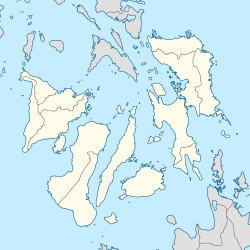 | |
| Motto | Honor, Excellence, Service [1] [2] |
|---|---|
| Type | National state university, research university |
| Established | July 1, 1947 |
Academic affiliations |
|
| Chancellor | Clement C. Camposano [3] |
| President | Angelo Jimenez |
Academic staff | 380 (2023) [4] |
| Students | 3,267 (2024–25) [5] |
| Undergraduates | 2,647 (2024–25) [5] |
| Postgraduates | 620 (2024–25) [5] |
Other students | 519 (High School) (2024-25) [5] |
| Location | Miagao, Iloilo (main campus); Iloilo City 10°38′30.08″N122°13′51.65″E / 10.6416889°N 122.2310139°E |
| Campus | Suburban |
| Hymn | " U.P. Naming Mahal " ("U.P. Beloved") |
| Colors | UP Maroon |
| Nickname | Fighting Maroons |
Sporting affiliations | State Colleges and Universities Athletic Association (SCUAA) |
| Website | upv.edu.ph |
 | |
The University of the Philippines Visayas (UPV or UP Visayas) is a public research university and the third autonomous constituent of the University of the Philippines System in the province of Iloilo, Philippines. [6] Originally established as a center for fisheries and marine studies, it has since evolved into a multidisciplinary university, offering programs in natural and life sciences, computational sciences, business and management, social sciences, humanities, and the arts. [7] The university also provides regional studies programs focused on the preservation and enrichment of Visayan cultural heritage.
Contents
- History
- Establishment
- Reorganization and Expansion
- Independence of regional units
- Administration
- Degree-granting units
- UP Visayas - Miagao Campus (Main)
- UP Visayas - Iloilo City Campus
- UP Visayas University Student Council
- Notable people
- See also
- References
- External links
UP Visayas traces its origins back to the University of the Philippines Iloilo College (UPIC), which opened in 1947 as the first UP campus in Iloilo City following World War II, offering high school and early college courses. [8] It was renamed UP College Iloilo (UPCI) in 1954 as it became a full-fledged higher education institution. [8]
In response to the need for a specialized center for fisheries and marine science education in the Visayas, the UP Board of Regents approved the establishment of the University of the Philippines in the Visayas on 31 May 1979, consolidating several UP units with its main campus in Miagao, Iloilo. [9] This name was later updated to University of the Philippines Visayas.
UP Visayas has two campuses—Miagao and Iloilo City — with Miagao being the main campus where the central administration offices are located.
Most of the students of the university are drawn from the Visayas and the Visayan linguistic groups. Many of the leaders of the Visayas graduated from UPV or its predecessor institutions. As of 2007, the Commission on Higher Education of the Philippines awarded four National Centers of Excellence and Development to UPV including Fisheries (UPV-Miagao), Marine Science (UPV-Miagao), and Biology (UPV-Miagao).









